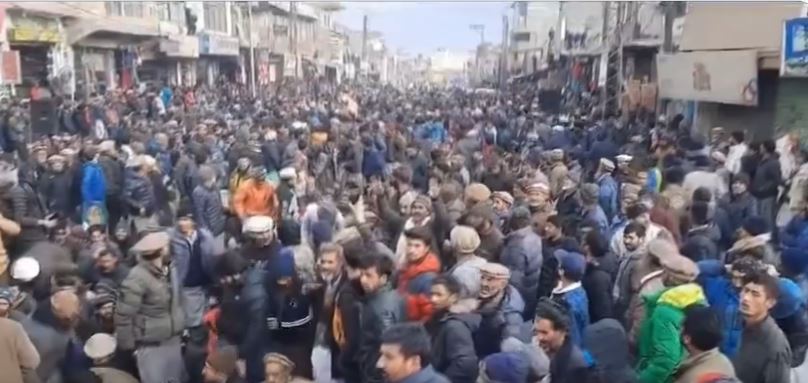
Over the last few weeks, the world has seen a mass mobilization of the people in the GB region, voicing for economic and social justice and sovereignty. A special report
As Pakistan’s economic conditions worsen, the situation becomes even more critical in the rather conflict-ridden region of Gilgit-Baltistan. Historically, the Gilgit-Baltistan (GB) region has been bereft of the autonomy of the indigenous people, subjected to communal and political violence and economic oppression in the name of development (like the construction of the Karakoram highway).
The ongoing protests in the region are broad-based protests demanding solutions to the multitude of economic hardships the people face. This involves restoring subsidies of wheat prices and revoking various newly implemented taxes. The protest also demands greater economic autonomy and property rights by returning the land ownership rights to the people of the GB region. The protestors are reclaiming all leases granted to outsiders for the exploitation of minerals in the area and regaining the royalty of the Diamer-Bhasha Dam under net hydel profit.
They also demand better socio-economic provisions like a 24×7 electricity supply and strengthened educational and health facilities. Strikingly, GP is the largest electricity producer in Pakistan through its hydropower plants, yet the populace suffers from extended power cuts. Yet another surprising fact is that GB is the only region in Pakistan where people are not allowed to own their lands. The struggle of people in GB is essentially geo-economic. Its abundant resources have become a curse as the federal government and external powers are extracting them without any meaningful compensation to the GB’s people.

Other than the rise in wheat prices, people are protesting the new Gilgit Baltistan Finance Act 2023, which introduced new taxes on the region’s tourism industry. The Awami Action Committee (AAC), which is leading the protests, demands financial resources through the National Finance Commission. This demand ties up to the larger assertion and demand for regional financial autonomy. The protest is also against the “Gilgit-Baltistan Revenue Authority Bill 2022,” which imposed new taxes on 135 items, impacting the poor in the region. The protestors call out that taxes are illegal as they are made to pay taxes without any representation in parliament or constitutional rights. The protestors are also demanding better health facilities. The leaders are protesting against the withdrawal of the subsidized health benefits card and asking for its reinstatement.
The region is not only economically threatened internally but also externally. The presence of external powers in their territory has been a concern of the populace for a long time. The local population has often raised concern over China’s excessive presence, and has resisted mining projects of gems and precious metals by Chinese in the GB region. People have also raised their voices against Chinese oppression as the Chinese firms deny locals jobs and compensation, and they are destroying their property, farms, and environment. Pakistan has been called out by experts for practically handing over GB to Beijing.
The region doesn’t get any share of the revenue generated by China through its operations, which is expected to amount to about half a billion dollars. Thus, GB protests are also a demand for regional autonomy and the rights of the locals on minerals and infrastructure of the region.
Given the situation, it is established that the GB conflict is not just an internal matter for Pakistan for many reasons. First, it is a geo-economic resource concern for the entire South Asia. The mistreatment and mishandling of the GB region by China threaten the security and sovereignty of South Asia given the excessive involvement of China in overseas territories. Second, as Pakistan is free-riding over the GB region by extracting all the region’s resources without any meaningful financial compensation, the demand for a merger with India is rising more than ever. Third, this is where Pakistan is stuck in a catch-22 situation of regional geopolitics. Pakistan wants to extract all the benefits from GB without giving any rights in return, whereas giving full statehood to the region would be beneficial to China but detrimental to Pakistan. Hence, GB is stuck in its ugly middle position with no economic and political autonomy. Apart from economic tensions, the region also faces socio-political tensions due to sectarian issues and the misuse of blasphemy laws by the federal government against the minorities in the region[9].
Over the last few weeks, the world has seen a mass mobilization of the people in the GB region, voicing for economic and social justice and sovereignty. GB leader Hussain Al-Husseini has urged people involved in various organizations and associations to participate in the sit-ins. The prolonged feeling of neglect and exploitation has rather provided new fuel to the separatist demands and merger with India. The people have objected to being treated as second-class citizens, which is reminiscent of the concerns faced by erstwhile East Pakistan (now Bangladesh) five decades back. The turmoil in the region adds more fuel to the fire in which Pakistan’s economy is burning. As the protests continue to get stronger, Islamabad can no longer keep on curtailing the rights and curbing the voices of people in the region.


